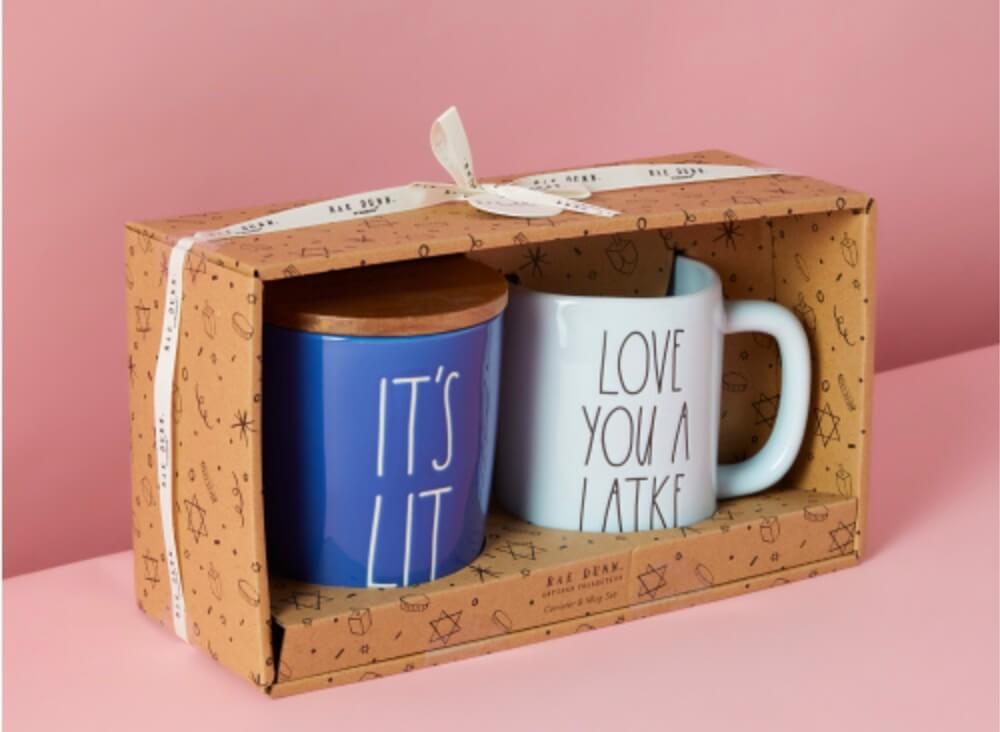How did Hanukkah — a holiday about war — get so schlocky?
The ‘live-laugh-love-ification’ of Hanukkah merch has seemed inescapable, until now

Some classic Hanukkah options. Graphic by Mira Fox
Stores do not have a great record with Hanukkah. Every year, earlier and earlier, it seems like red and green takes over everything; the other day, I walked past a store that sells bones, taxidermy and fossils, and even it was dominated by a Christmas display. Hanukkah, meanwhile, is usually relegated to a few blue and white Stars of David in a corner and an endcap of candles and matzo. (Why is there always matzo?)
And then there’s the Hanukkah merchandise. The wrong number of branches on the menorah. Dreidels with incorrect letters, or letters printed upside down. Kitschy T-shirts with groan-worthy puns. (“Oy to the world.”) Pillows featuring Passover slogans embroidered next to menorahs. Even Hanukkah trees, wreaths, stockings and, yes, Santa Claus figurines because anything blue and white is Jewish — right?
This year, it seems like the trend of terrible Hanukkah merch is finally changing; finally, some retailers are getting it right. Target has Hanukkah pajamas that are actually kind of cute. The menorahs (well, mostly) have nine branches. But a lot of the options still feel, well, off.
Sure, there are fewer overt mistakes. But most options still seem pretty divorced from the holiday. Brand Rae Dunn — famous for causing Midwestern moms to fight over mugs at Home Goods — is selling mugs with kitschy slogans like “Love you a latke.” There’s a gnome holding a “live, laugh, latke” sign.

Even the less punny, more serious designs strive to be inspirational with sayings about spreading light to the world. “May your holiday be as bright as a fully-lit menorah,” says a piece of decorative wall art at Bed Bath & Beyond. A mug at Target features an illustration of sufganiyot labeled “filled with love.”
Do they know that Hanukkah is about war, not peace? In the real Hanukkah story, a small group of zealous Jews revolt against the Seleucid empire, as well as their fellow assimilated or Hellenized Jews.
Now that stores (except Walmart) seem to have finally learned how many candles there are on a menorah, I wondered if we might go even further. Perhaps we’re ready for a movement to get away from the Christmas-lite kitsch that defines the holiday. So I talked to one of the only people offering Hanukkah merch that embraces the holiday’s true spirit.
‘Less assimilation, more celebration’
Rachel Kenneth is well positioned to observe the trends in Hanukkah merch; last year, she launched an Instagram account, @hanukkahfails, to track the worst — and, occasionally, the best — of the available products.
After collecting all the worst Hanukkah merch, including cringey puns and misnumbered menorahs, on her Instagram account, Kenneth jokingly made a mockup of some shirts that felt more legitimately in the Hanukkah spirit, such as a T-shirt that said “Revolt and Rejoice” and a baby onesie reading “guerilla warfare” to reference the Maccabees’ fighting spirit.
The whole thing started out as a “lark,” she said. But to her surprise, there seemed to be actual demand. So this year, she launched a line of merch featuring slogans like “less assimilation, more celebration” and “death, destruction & dreidels” on T-shirts, sweatshirts and hats.
Her designs, which feature cheery graphics of Stars of David and dreidels, are a clear spoof of the usual Hanukkah options, which are so focused on being inspirational that they miss the real story of the holiday.
“The live-laugh-love-ification of Hanukkah is everywhere,” she said. “Hanukkah is really not about love, it’s really not. It’s not anywhere in the story. We do all gather, so I guess implicit in that is coming together as family or friends, and there’s an element of love there. But it has nothing to do with Hanukkah. And peace — I suppose after the temple was destroyed and rededicated, there was peace?”
“Last year I wanted the Hanukkah gnomes to go away, and this year I want the ‘live laugh love’ to go away,” she said, laughing. “I’m a little bit, for lack of a better word, grinchy, this time of year.”
Kenneth, who lives in New York, emphasized that she’s glad for any representation of Hanukkah. She grew up in North Florida — which, she made sure to note, is not the part of Florida with the Jewish retirees — and there was little understanding of Judaism outside of her immediate community. She’s glad that people have the opportunity to celebrate Hanukkah in whatever way they want.
“People from more rural areas are happy just to have anything. So it’s kind of a luxury to be picky about it,” she said.
But she still wishes there were more options, especially at a time of rising antisemitism. Kenneth pointed out that the real story of Hanukkah, with its complex themes about persecution and assimilation, feels more relevant than ever.
“I hate to be so serious,” she said. “There’s so much intelligent discourse we could be having this time of year. And instead we’re just making more dreidel puns.”

















